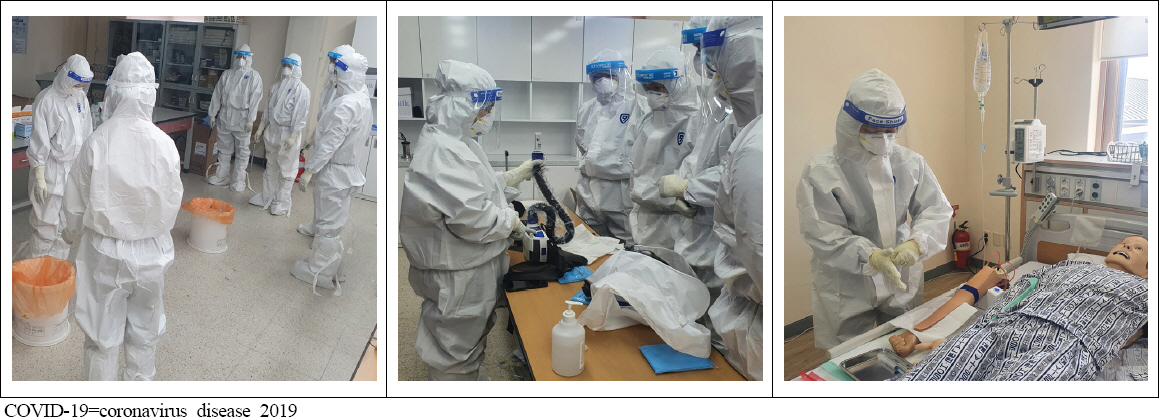1. Korea Disease Control and Prevention Agency. Guidelines for response to COVID-19. 11th ed [Internet]. Cheongju: Korea Disease Control and Prevention Agency; 2022 [cited 2022 Feb 25]. Available from:
https://www.kdca.go.kr/board/
2. World Health Organization. WHO coronavirus (COVID-19) dashboard [Internet]. Geneva: World Health Organization; 2022 [cited 2022 Apr 20]. Available from:
https://covid19.who.int/
3. Korea Disease Control and Prevention Agency. Coronavirus (COVID-19), Republic of Korea [Internet]. Cheongju: Korea Disease Control and Prevention Agency; 2022 [cited 2022 Apr 23]. Available from:
http://ncov.mohw.go.kr/
9. Park HY, Kim YJ. Infection control education programs for nursing students:A systematic review. Journal of Korean Academy of Fundamentals of Nursing. 2021;28(2):237-248.
https://doi.org/10.7739/jkafn.2021.28.2.237

12. Yoo EY, Jung YK. Training effectiveness of the COVID-19 infection control simulation program on nursing students. The Journal of Humanities and Social Sciences 21. 2020;11(6):939-953.
https://doi.org/10.22143/HSS21.11.6.66

13. Cohen J. Statistical power analysis for the behavioral sciences. 2nd ed. New York: Lawrence Erlbaum Associates; 1988. p. 1-567.

14. Yun SR. Correlations between nurses'knowledge of COVID-19 and infection control compliance, resilience, and psychosocial well-being [master's thesis]. Seoul: Chung-Ang University; 2020. p. 1-82.
15. Choi JY. Nurse's knowledge, attitude and use of personal protective equipment related to acute respiratory infections [master's thesis]. Seoul: Yonsei University; 2016. p. 1-77.
16. Baik JH. A study on nursing intension and knowledge, attitudes about COVID-19 and personal protective equipment of nurses in general hospitals [master's thesis]. Gunpo: Hansei University; 2020. p. 1-100.
17. Park GS. The study on the health center avian influenza worker's knowledge, attitude and practical skills about management of avian influrnza [master's thesis]. Gimhae: Inje University; 2006. p. 1-45.
18. Kim MJ. The convergence study of nursing students'knowledge, attitudes and preventive behaviors against MERS in South Korea. Journal of the Korea Convergence Society. 2017;8(4):149-157.
https://doi.org/10.15207/JKCS.2017.8.4.149

19. Seels BB, Richey RC. Instructional technology the definition and domains of the field. Washington, D. C: Association for Educational Communications and Technology; 1994. p. 1-186.
22. Jung HJ. Development and application of self-directed simulation education program based on planned behavior theory:MERS scenario experience and nursing intention. The Journal of Humanities and Social Sciences 21. 2018;9(2):1035-1048.
https://doi.org/10.22143/HSS21.9.2.82

24. Sun Y, Wang D, Han Z, Gao J, Zhu S, Zhang H. Disease prevention knowledge, anxiety, and professional identity during COVID-19 pandemic in nursing students in Zhengzhou, China. Journal of Korean Academy of Nursing. 2020;50(4):533-540.
https://doi.org/10.4040/jkan.20125


25. Kim HW, Kim MG. The relationship among academic achievement, clinical competence, and confidence in clinical performance of nursing students. The Journal of Korean Academic Society of Nursing Education. 2021;27(1):49-58.
https://doi.org/10.5977/jkasne.2021.27.1.49











